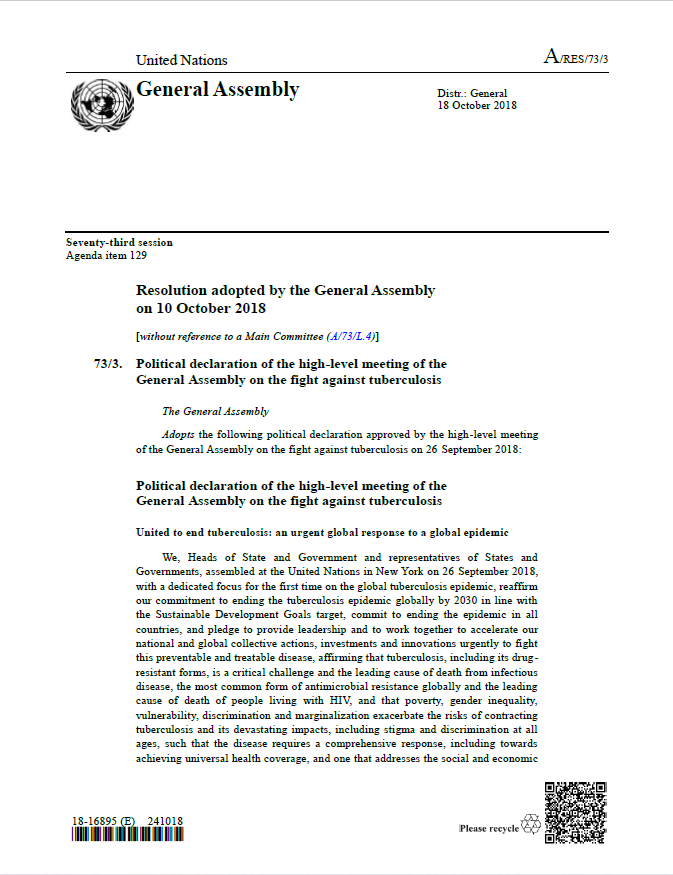2018 Political declaration of the HLM on the fight against TB
Analysis of precedential value
This declaration is the product of the first-ever UN High-Level Meeting on Ending TB in September 2018. It was adopted by the UN General Assembly (GA) without a general vote the following month. The General Assembly is the preeminent governing body of the UN system and consists of all 193 UN Member States.
The UN press team described the GA’s adoption as follows: “world leaders in the General Assembly today reaffirmed their commitment to end the global tuberculosis epidemic by 2030, unanimously adopting a political declaration committing them to accelerate national and collective actions, investments and innovations in fighting the preventable disease.” It also noted that leaders were keen to collaborate with HIV/AIDS programs.
Used as precedent
key population and community leadership
“Recognize the enormous, often catastrophic, economic and social impacts and burden of tuberculosis for people affected by the disease, their households, and affected communities, and that the risk and impact of tuberculosis can vary depending on demographic, social, economic and environmental circumstances, and, in order to make the elimination of tuberculosis possible, prioritizing, as appropriate, notably through the involvement of communities and civil society and in a non-discriminatory manner, high-risk groups and other people who are vulnerable or in vulnerable situations, such as women and children, indigenous peoples, health-care workers, migrants, refugees, internally displaced people, people living in situations of complex emergencies, prisoners, people living with HIV, people who use drugs, in particular those who inject drugs, miners and others exposed to silica, the urban and rural poor, underserved populations, undernourished people, individuals who face food insecurity, ethnic minorities, people and communities at risk of exposure to bovine tuberculosis, people living with diabetes, people with mental and physical disabilities, people with alcohol use disorders and people who use tobacco, recognizing the higher prevalence of tuberculosis among men.” (paragraph 17)
human rights
“Recognize the various sociocultural barriers to tuberculosis prevention, diagnosis and treatment services, especially for those who are vulnerable or in vulnerable situations, and the need to develop integrated, people-centred, community-based and gender-responsive health services based on human rights.” (paragraph 18)
“Commit to developing community-based health services through approaches that protect and promote equity, ethics, gender equality and human rights in addressing tuberculosis by focusing on prevention, diagnosis, treatment and care, including socioeconomic and psychosocial support, based on individual needs, that reduce stigma, and integrated care for related health conditions, such as HIV and AIDS, undernutrition, mental health, non-communicable diseases including diabetes and chronic lung disease, and tobacco use, harmful use of alcohol and other substance abuse, including drug injection, with access to existing and new tools.” (paragraph 26)
access to health products, universal health coverage
“Commit to promoting access to affordable medicines, including generics, for scaling up access to affordable tuberculosis treatment, including the treatment of multidrug-resistant and extensively drug-resistant tuberculosis, reaffirming the World Trade Organization Agreement on Trade-Related Aspects of Intellectual Property Rights (TRIPS Agreement), as amended, and also reaffirming the 2001 World Trade Organization Doha Declaration on the TRIPS Agreement and Public Health, which recognizes that intellectual property rights should be interpreted and implemented in a manner supportive of the right of Member States to protect public health and, in particular, to promote access to medicines for all, and notes the need for appropriate incentives in the development of new health products.” (paragraph 19)
key and vulnerable populations
“Commit to preventing tuberculosis for those most at risk of falling ill through the rapid scaling up of access to testing for tuberculosis infection, according to the domestic situation, and the provision of preventive treatment, with a focus on high-burden countries, so that at least 30 million people, including 4 million children under 5 years of age, 20 million other household contacts of people affected by tuberculosis, and 6 million people living with HIV, receive preventive treatment by 2022, and with the vision of reaching millions more, and further commit to the development of new vaccines and the provision of other tuberculosis prevention strategies, including infection prevention and control and tailored approaches, and to enacting measures to prevent tuberculosis transmission in workplaces, schools, transportation systems, incarceration systems and other congregate settings.” (paragraph 21)
“Commit to providing special attention to the poor, those who are vulnerable, including infants, young children and adolescents, as well as elderly people and communities especially at risk of and affected by tuberculosis, in accordance with the principle of social inclusion, especially through ensuring strong and meaningful engagement of civil society and affected communities in the planning, implementation, monitoring and evaluation of the tuberculosis response, within and beyond the health sector; we further acknowledge the link between incarceration and tuberculosis and therefore reaffirm the United Nations Standard Minimum Rules for the Treatment of Prisoners (the Nelson Mandela Rules) as defined in General Assembly resolution 70/175 of 17 December 2015.” (paragraph 29)
negative legal determinants, universal health coverage
“Commit to protect and promote the right to the enjoyment of the highest attainable standard of physical and mental health, in order to advance towards universal access to quality, affordable and equitable prevention, diagnosis, treatment, care and education related to tuberculosis and multidrug-resistant tuberculosis and support for those who become disabled due to tuberculosis, integrated within health systems towards achieving universal health coverage and removing barriers to care; to address the economic and social determinants of the disease; and to promote and support an end to stigma and all forms of discrimination, including by removing discriminatory laws, policies and programmes against people with tuberculosis, and through the protection and promotion of human rights and dignity, as well as policies and practices which improve outreach, education and care.” (paragraph 28)
